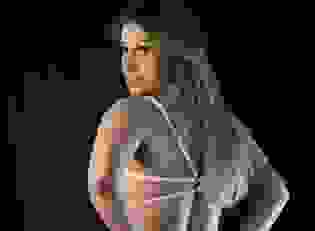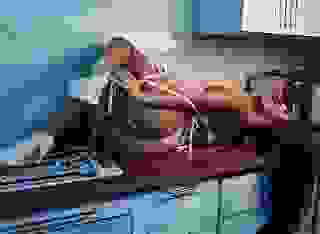Note: You can change font size, font face, and turn on dark mode by clicking the "A" icon tab in the Story Info Box.
You can temporarily switch back to a Classic Literotica® experience during our ongoing public Beta testing. Please consider leaving feedback on issues you experience or suggest improvements.
Click hereAt that time surfboards were beginning to change. The traditional long and heavy boards were being replaced by short, fibreglass Malibu boards which were much more manoeuvrable. I borrowed a long board and showed that I could ride it. They and their friends showed me stunts with the short boards that I hadn't learned. I tried, and failed.
I persuaded the twins to join me on the long board, and for a few attempts we managed to surf with a twin perched on each of my shoulders. That would have been impossible on the new short boards. It would have been impossible if the twins hadn't been experienced surfers too.
I changed back into Scout uniform before we left the beach. A few people actually clapped us for our performance.
Back at the twin's parents house we had a barbecue before their father ran me back to the Jamboree site in his car.
The last day of the Jamboree was marred by swirling dust as we tried to march past the assembled dignitaries for a farewell. After the first dozen or so Patrols had passed the visibility was minimal so we assembled in contingents by Country and State and waited for the dust to settle.
When I arrived back in Melbourne after the Jamboree I had been an Australian Scout for about three weeks. During the next year I went on as many Scouting activities as possible. The Victorian Scout Association had recently been given a large area of land in the hills East of Melbourne and were beginning to develop it with Scout assistance. The first task had been to build a road into the site. That included bridges over several seasonal streams. Unlike UK pioneering, Australian Scouts built real bridges capable of supporting lorries. We mixed and poured cement, bolted steel girders together, cut down trees for bridge supports and sawed planks for the bridge decking.
The first stream was fun for those who had been to the site on earlier occasions. It always had water in it except in high summer, and it also had Iron Pyrites. Newcomers would get excited by the sight of real gold in the stream and would eagerly gather it until they, like us, found that Iron Pyrites is Fools' Gold.
But the Victorian Scout Association arranged a long weekend at the old gold fields at Ballarat, scene of the 19th Century gold rush. Four hundred Scouts descended on the old gold fields and all of them had been given earlier lessons on how to pan for gold. Within hours of our arrival almost every Scout troop had signs of colour, miniscule flecks of gold. Four hundred Scouts working for about twelve hours over the three days produced a total of gold worth seven Australian pounds or about five UK pounds.
Scouts go for hikes. I needed to do a serious hike to help me to qualify to be a Queens Scout. Around Melbourne - then- there were still areas marked on maps as 'unsurveyed', not quite the same as 'unexplored' but not officially mapped. All the map makers had were aerial surveys of the tops of trees. There could be streams, gullies, ravines. They didn't know. Of course the locals knew, and so did the 19th Century gold diggers, but officially the terrain was unknown.
So one weekend Duncan and I set off, travelling as far as we could be steam train, then by bus to a rural community, and set off into the unknown. Over the next three days we walked twenty miles beyond the jeep track and found a stream to camp beside. That was a mistake. Don't camp BY a stream, camp close to but AWAY from the water. Why? Because all the local wildlife would use the stream for drinking and washing. We were kept awake by kangaroos, wallabies and wombats. The worst? Kookaburras.
Kookaburras are social birds. They perch in groups usually in a single tree. They are also very very loud. When one kookaburra stirs on its perch, it disturbs its neighbour, who objects. That objection disturbs all the other kookaburras who start complaining loudly. The sound of one kookaburra is like a pneumatic drill digging up the road. One hundred kookaburras is deafening.
That hike was the first of several into the unsurveyed areas. Duncan's father collected antique weapons and he suggested that we should try living off the land instead of taking all our food with us. On the first such hike we both took Lee Enfield military rifles. Why not? The school cadet force trained every pupil with Lee Enfields and heavier weaponry. Our school cadet force was over-equipped even by Australian standards because of donations from the Old Boys. Owen sub-machine guns, heavy machine guns? Of course. Mortars? Yes. Field artillery and a tank? Yes.
That first armed trip was nearly a disaster. We were stalking wallabies when Duncan saw a larger kangaroo. He swung his rifle, tripped over a tree root and shot me in the leg. We were very lucky. We were using WW2 cartridges and that one was a partial misfire. I was able to pull the bullet out of my leg because it had only gone in a quarter of an inch. We didn't tell our parents. We had had worse injuries as Scouts.
Those armed trips became too easy for us. To make them more interesting we borrowed older weapons from Duncan's father. I had a Baker Rifle from the Napoleonic wars. It was muzzle-loading, used black powder and the bullets were the size of my thumb. Duncan took a German Mauser rifle from World War 1 and a mid-19th Century Dragoon Colt revolver. That revolver had been the most powerful hand gun in the world for about thirty years.
My Baker rifle and his revolver kicked like mules. He hit nothing with the revolver, not even a tree twenty feet in front of him. I saw a large rabbit about one hundred yards away and aimed at it with the rifle. Duncan always claimed that my shot was a fluke. It probably was. I hit the rabbit full in the body, but that rabbit was useless for food. The massive bullet had turned it into rabbit mince spread over a few square yards.
Gradually I was acquiring more badges. I had a Bushman's thong for activities in real unsurveyed Australian bush. The Australian Scout tradition for knife wearing was different. Every Scout was expected to carry a snake kit which included a scalpel and a tourniquet. Ist Class Scouts wore large sheath knives. Those who had passed Axemanship wore a hand axe on the opposite hip to the sheath knife, or if on parade could carry a felling axe on a shoulder instead of the scout staff.
But those with a Bushman's thong? Instead of the axe, and axemanship was a requirement, they carried a machete. Like all scout knives and axes it was assumed that a blunt edge was a disgrace. My sheath knife and my machete were sharp enough to shave with.
The Queen's Scout badge was now a possibility. As part of that I had to undertake some community activity. As a Patrol Leader I was already involved in recycling. At the time Australian beer bottles weren't recycled except in quantity. Most Australian scout troops organised several beer bottle collecting sessions each year. We would be paid for every 100 bottles delivered to a designated point. I was the local Scout organiser for that, but that wasn't enough.
However I was also involved as an assistant leader of the youth group of our local church. Unlike the Scouts, it was a mixed sex group. I had been organising what would now be called discos, but were then called teenage dances. I had a real problem with every one of those dances. The girls would sit at one end of the hall, the boys at the other and never the twain would meet. The girls might dance with each other. The boys might do the twist - alone.
When I attended the first dance after joining the youth group, about the same time as I joined the Australian scout troop, I didn't understand the social conventions. I crossed the empty space and asked a girl to dance. She was so surprised that she took my hand and danced with me. We had to dance at the girls' end. She couldn't cross the invisible barrier.
I asked another girl. She refused. I was rude enough to ask why.
"We don't," she replied. "The boys don't ask us."
"I just have," I said. "Come on, please?"
After that dance I went back to the boys' end and tried to persuade some boys to come with me to the girls and ask them to dance. They refused.
I went over to the record player and stopped the music.
I stood in the middle of the untouchable space and said loudly.
"This is ridiculous. This is a dance and you sit apart. Everybody! Stand up and come here."
To my surprise they did. They started talking to each other and complaining that I was an interfering Pom (English immigrant).
"Gentlemen," I shouted above the hubbub, "Please ask the lady closest to you for a dance even if she is your sister."
It worked. I turned the music back on and from that time onwards I was an assistant youth club leader.
But it was back to normal at the next dance. I had to repeat the process several times before the boys and girls got together at the start of the next dance evening. Even acknowledged boyfriend and girlfriend wouldn't cross that imaginary barrier without me bullying them.
Being an assistant youth leader could be hard work organising others into activities but it counted towards my Scout badges (and I met more Australian girls).
I was in Australia for less than two years. I travelled back to the UK by liner and rejoined my old school. I had just qualified for the Queen's Scout award but I didn't have time to be invested with it in Australia.
Back in the UK I rejoined my London troop. I was given the Queen's Scout certificate and badge at the first troop meeting. I was still wearing my Australian Scout uniform, mountie hat and machete. I was only the third Queen's Scout since that troop had been formed in the 1920s. As I said earlier, they didn't believe in badges.
As a new Queen's Scout I was invited to the St George's Day Parade in London. I wore my hat and machete.
A few weeks later I was asked to be a car park attendant for a Buckingham Palace garden party. I wore my hat and machete. An equerry queried my machete. I explained that it was part of my Australian Scout uniform. He was dubious but a more senior person overruled him.
"This is a Queen's Scout. He has demonstrated responsibility to become one. He won't draw it or wave it around."
I didn't. I did get some odd looks from some of those arriving for the Garden Party. I think most of the looks were for my hat, not the machete.
By the next Garden Party I had changed into my UK Scout uniform so my machete was not appropriate but like almost all the Scouts acting as car park attendants I was wearing a large sharp sheath knife.
That May Day weekend we went canoe camping on the Medway. The idea was to start from Tonbridge and get to Allington lock in Maidstone. We didn't own any canoes so we had borrowed them from another local Scout Group.
We launched our canoes successfully and proceeded downstream. I hadn't gone more than a couple of hundred yards before I knew my canoe was leaking. It was. I could paddle for about ten minutes before I had to land and empty out the water, or I'd sink. After a few landings I decided this was pointless. I put the small wheels on the canoe and pulled it along the riverside path while my friends paddled. Attempts to fix my canoe that Saturday evening were unsuccessful.
We were camping that first night in a field behind a pub. We had found that most of the other canoes had leaks too, not as serious as mine, but disconcerting. Over the evening meal we decided to stay camped where we were and canoe from that location.
Monday was my 18th birthday. The day before had been the 18th birthday of my friend Pete, he of the burnt 1st Class meal. After packing all our kit including the canoes, my Scout friends decided that our birthdays should be celebrated properly.
Until then I had been teetotal. I had signed the pledge, as had my brother and sister, at the age of seven. But on my 18th birthday I decided that I would like to see what I had been missing, particularly as my friends were buying my first ever pint. I liked it and had several pints. My fellow Scouts thought I would be adversely affected by my first taste of alcohol. They were disappointed. They intended to try again on our summer excursion when all of us would be over 18.
Now for the final unrecorded, or incorrectly recorded, Scout activity.
While I had been in Australia my contemporaries in my English Scout troop, now Senior Scouts, had been on more adventurous activities. They had been mountain climbing in Snowdonia, to Corfu, and wanted to go somewhere different. They had decided on then-Communist Yugoslavia, but not the main parts. They wanted to go to an island in the Adriatic.
It took considerable organisation by the leaders and research by us. We had chosen the island of Korcula, going to it by ferry from Split. We would travel by train to Belgrade, by a local train to Split where we would stay two nights on an official camp site, then by ferry to Korcula.
We tried to find out as much as we could about Korcula. At the time there wasn't much. Even the maps we found couldn't agree on the size or shape of the island. We knew it had a substantial history but not much about its geography. We also used Scout meetings to learn basic Serbo-Croat. We intended to survey and map the island as best we could.
The crossing from Dover to Ostend was uneventful. We joined a sleeper train to Munich. We couldn't book enough sleeper berths so about a third of us sat up all night. What we didn't know was that the train would be split into two halves en route. The sleeper part would take a slower, longer route. The other carriages would arrive in Munich two hours earlier. I was with the sitting group.
When we arrived in Munich the six of us got off the train but our leaders were in the sleeper part. We didn't know where they were, when or if they would arrive, and we didn't have the tickets for the onward journey.
Apart from the confusion we had another problem. The food was with the others. We were hungry and thirsty. I was the only one in our small group who could speak any German at all. I managed to ask a railway employee about the missing carriages. He explained that they would arrive later, but only a quarter of an hour before the connection we had to catch to go to Belgrade.
We had no German money. We had English pounds but one had ten US dollars. I managed to persuade the owner of a sausage stall to sell us some hot dogs and coffee for dollars.
When the others arrived they were jealous. They had been eating stale sandwiches brought from England. But we had to hurry. We were booked on the Orient Express from Munich to Belgrade. If we weren't in our seats five minutes before departure we would lose our reservations. We made it just in time.
We had been excited at the prospect of travelling on the famous Orient Express. It was a disappointment. The carriages were shabby and dirty inside and out. I picked up a small sign from the floor of my compartment. We went back to sleep again until we reached the Yugoslav border. The border guards walked through the train checking passports but mine caused a real problem. It wasn't a standard British UK passport but one issued by the Governor of Gibraltar. I was escorted off the train at gunpoint. My Serbo-Croat wasn't good enough to explain.
I was sat down by the trackside with four rifles pointed at me while the sergeant went to get an officer. I wasn't the only person taken off the train but I was the only one facing the rifles. The officer arrived. He looked at my passport and said - in German - that it was a crude forgery. He had never heard of the Governor of Gibraltar. He sent the sergeant to fetch a more senior officer who could speak English. Until he arrived I was to be watched carefully. I might be dangerous.
The English speaking officer also hadn't heard of the Governor of Gibraltar. I took out my Scout Diary, and in the atlas in the front I showed him Gibraltar, underlined in red, on a map of the Mediterranean. He sent a soldier back to the border office to bring a larger atlas. That too confirmed the existence of Gibraltar. I, and our leaders, were concerned that the train might leave without me.
The officer reassured us. If I was a suspicious person, the whole group would be refused entry into Yugoslavia and put on the next train going the other way. Until then? The Orient Express was going nowhere, as usual. He said the longest recent delay to the train had been five hours.
The Scout leaders were ordered back on the train. I was still detained as the officer read through my passport carefully. He was familiar with the wording for British passports and saw that the Governor of Gibraltar's message in the front was different. Where the Secretary of State politely requested, the Governor of Gibraltar ordered. Who was the Governor of Gibraltar to tell Yugoslavia what to do? I suggested that as the Governor was a military general, he was possibly less diplomatic in his choice of words. That seemed acceptable but the officer asked:
"What could the Governor of Gibraltar do to Yugoslavia if we annoy him?"
My response was that the Governor would be unlikely to take any action over an insignificant person like me.
The officer insisted. What military powers did the Governor control?
I replied that he had guns and might be able to stop ships going through the Straits of Gibraltar.
"My men have guns," the officer said, pointing at the rifles aimed at me.
"Big guns. Artillery," I said.
"How big?"
I held my hands about a foot apart.
"That big," I said.
"My soldiers guns are longer than that."
It took a couple of minutes before he realised I was indicating the bore of Gibraltar's guns, not the length.
He asked the range of Gibraltar's guns. I was beginning to suspect he wanted accurate military information which I shouldn't give.
"They can shoot far enough to reach Africa," I replied. That is about ten miles. Because of their elevation, some then Gibraltar guns could fire shells thirty miles. I knew that but I wouldn't tell a Yugoslav officer.
By this time it was obvious that he didn't see me as a serious threat to Yugoslavia. We shook hands and I was allowed to rejoin the train. It was another half an hour before all the suspect passengers were cleared. Once the train was moving again another passenger said that if I had placed a one pound note in my passport there would have been no interrogation. We just weren't used to Balkan customs...
We were again worried that we would miss our connection in Belgrade for the local train to Split. We need not have. All connections to the Orient Express will NOT leave a station in Yugoslavia until ten minutes after the Express's arrival. After the faded grandeur of the Orient Express the local train was a shock. We were travelling first class but all that meant was the carriage had windows instead of open sides. We were sitting on hard wooden seats.
In Split we needed a bus to get to the camp site, not because of the distance but because of our equipment. Yet another problem. The fare was two dinars per person no matter how long or short the journey. We needed to pay 36 dinars for the party of 18. But the lowest denomination note we could get in London was 500 dinars. We were told to take the absolute minimum of Yugoslav dinars and change pounds or dollars once we were in the country.
The bus conductor couldn't change a 500 dinar note. But one of the passengers gave us a 50 dinar note in exchange for five English cigarettes. Many of us were carrying duty free cigarettes obtained on the ferry because we had been told, even if we weren't smokers, that English or American cigarettes were as good as hard cash in Yugoslavia. We offered the 50 dinar note to the conductor. We didn't want the change. She insisted that she was a government employee and couldn't accept tips. The man who had given us the note whispered in English (What she means is she can't while the rest of the passengers are watching. Any of them might be a government spy.)








